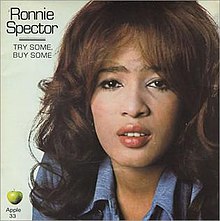Try Some, Buy Some
| "Try Some, Buy Some" | |
|---|---|
 |
|
| Single by Ronnie Spector | |
| B-side | "Tandoori Chicken" |
| Released | 16 April 1971 |
| Format | 7-inch vinyl |
| Recorded | February–March 1971 Abbey Road Studios, London |
| Genre | Rock |
| Length | 4:08 |
| Label | Apple |
| Writer(s) | George Harrison |
| Producer(s) | Phil Spector, George Harrison |
| "Try Some, Buy Some" | |
|---|---|
| Song by George Harrison from the album Living in the Material World | |
| Published | Harrisongs |
| Released | 30 May 1973 |
| Genre | Rock |
| Length | 4:08 |
| Label | Apple |
| Writer(s) | George Harrison |
| Producer(s) | George Harrison, Phil Spector |
| Living in the Material World track listing | |
|
11 tracks
|
|
"Try Some, Buy Some" is a song written by English musician George Harrison, first released in 1971 as a single by former Ronettes lead singer Ronnie Spector. The latter recorded this and other Harrison compositions, such as "You" and "When Every Song Is Sung", in London for a planned comeback album on the Beatles' Apple Records. The project was co-produced by her husband at the time, Phil Spector, whose temporary withdrawal from music-making in 1966 had forced Ronnie to reluctantly abandon her own career. After the single became only a minor hit, and following recording sessions that had been hampered by the producer's erratic behaviour, the proposed album was cancelled. In 1973, Harrison added his own vocal onto a new mix of the instrumental track and included the result on his album Living in the Material World.
Harrison wrote "Try Some, Buy Some" during sessions for All Things Must Pass, his successful 1970 triple album, also co-produced by Spector. The song's austere melody was influenced by Harrison composing on a keyboard instrument rather than guitar. The lyrics reflect his perception of God amid temptations associated with the material world and take the form of a recollection of his first spiritual awakening. Ronnie Spector later admitted to being unable to understand the concept and disliking the song, and commentators have duly noted its unsuitability as a vehicle for her comeback. "Try Some, Buy Some" is notable for the extent to which Phil Spector employed his Wall of Sound production, as well as for being a significant commercial failure for Spector, in the manner of his ambitious 1966 production "River Deep – Mountain High", by Ike & Tina Turner. The recording features a choir and long, lavishly orchestrated instrumental passages, the musical arrangement for which was supplied by John Barham. Besides Harrison, the backing musicians include Leon Russell, Pete Ham, Klaus Voormann and Jim Gordon. The single's B-side was "Tandoori Chicken", an upbeat song in the rockabilly style.
...
Wikipedia
